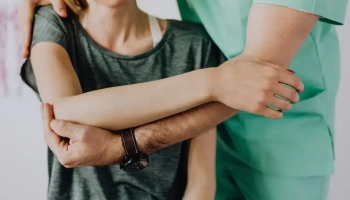If you are looking for a good bed exit alarm that will signal you when the patient turns or makes movement as though to wake up from their bed, then the smartcaregiver motion sensor and pager is your best pick. We reviewed it and found that using it, we were able to reduce bed falls by 70%.
According to statistics from the National Council on Aging, one in four seniors above 60 years falls each year and these falls are dangerous, could lead to injuries or even lead to fatality. These falls are troubling both emotionally and economically. Krislindahl in looking at what to do to improve the home for seniors state the use of bed alarms as a necessity. One of the most frequent places where the elderly fall is in the bedroom when they are getting up. So you would not prevent that kind of fall with bed rails, would you? In this article, we will be discussing the best bed alarms for dementia patients so that you as the caregiver can be alerted before the fall happens and therefore avert it.
And no, this article is not on bed alarms for dementia patients alone. All the eldery are at the risk of these falls.
Bed falls should be avoided by all means whether by use of safety bed rails and bedside mats. However, in the case of dementia, the patient wants to do things on their own. They do not want you to monitor them and so they want to wander away immediately they wake up. To avoid these falls and unnecessary noise from the eldery, install a bed exit alarm so that you as the caregiver are alerted while it does not make any sound in the patient’s room.
#1.SMART CAREGIVER TL-5102MP Motion Sensor And Pager
Nicknamed the caregiver’s best friend, this bed alarm for elderly sends wireless signals to a pager that you the caregiver have under your belt. There is absolutely no noise that is made inside the patient’s room. Differently from other bed exit alarms, this does not involved a pad placed under the patient’s mattress but is a motion sensor device that detects any movement made by the patient.
Check Lowest Price on Amazon
No noise made in the patient’s room
No loud alarms all over but rather pager signals.
Allows you to monitor the patient remotely.
You have to replace the three AAA batteries on motion sensor and 2 on pager after they die.
#2.Secure Patient Monitoring Magnet Pull Cord Alarm
Check Lowest Price on Amazon
The magnetic pull cord alarm can be used on not only a bed but also on a wheel chair and will alert you when the patient exits the bed or tries to wander away from a wheelchair. It is made of break resistant material which is a good thing since dementia patients might want to break open the noisy alarm since it reports of their unsupervised wanderings.
It comes with two alert tones and three volume levels. Once the battery is about to die, the system will alert you with beeps so that you can fetch for a replacement.
Non breakable material prevents patient from breaking it
Does not feature an on and off switch. At times you will have to manually turn off the alarm
If carelessly installed, the cords can gag the patient
Makes noise in the patient room
#3.Wireless (Cordfree) Bed Alarm and Bed Pad
Check Lowest Price on Amazon
The wireless cordfree bed alarm and pad is made in such a way that only you the caregiver gets a notification or chime but the alarm remains silent in the patient’s room. This way, you are able to know when they have woken up, when they want to wander and get to their room before a fall happens.
The pad is placed under the patient’s shoulders so that when they wake up, it will sense a depression and alert the alarm which rings in your room
The alarm can be placed 100ft away from the patient room and still receive signals and alert you
Comes with chargeable batteries
Does not make any sound in the patient’s room
The pad is vinyl covered and easy to clean up
It is wireless and so no cords running in the patient’s room
#4.Floor Mat Exit Alarm for Elderly Fall Prevention & Anti-Wandering – Economy System
Check Lowest Price on Amazon
If you do not want to use gadgets that are going to be placed on the patient’s bed, you can always use a floor mat exit alarm that alerts you when the patient wakes up and steps on the mat that is placed right next to their bed. Coming with a floor mat as well as an alarm system that you can place in the caregiver’s room, the alarm makes audible tones in the caregiver’s room without the knowledge of the patient who might just start wandering unsupervised.
Makes no sound in the patient’s room
Adds aesthetic appeal in patient’s room
Patient might pull away the mat and step on the floor making you miss the alarm.
Secure 45BSET-5 Bed Exit Alarm Set for Fall Management and Wandering Prevention – High Quality Caregiver Patient Alert with Adjustable Volume and Tone – Batteries Included
Check Lowest Price on Amazon
The secure 45BSET-5 bed exit alarm helps you to reach the patient before a fall happens. It has adjustable volume and a very unique alarm that alerts you wherever you are to quickly reach the patient and supervise them before a fall happens or they wander away.
The pad resting on the patient’s bed is easy to clean and free from allergens. It also has no odor.
Alerts you of any attempt to rise from bed
Very unique sound
Noise is in the patient’s room.
Efficacy of bed alarms for dementia patients
Research has shown that bed alarms are not that effective if there are no caregivers near the patient who will respond promptly when they hear the alarm go. Some researchers have even termed them as expensive for nothing after studies were conducted that showed that there was no significant reduction in the number of falls when patients used these bed alarms for elderly. I however tend to disagree since from my experience, the alarms if used right by trained caregivers are going to significantly reduce the number of falls and anxiety in patients.
The use of bed rails could also be useful in making the beds much more safer and if you feel that the rails are going to hurt the patient, there are softer alternatives called bed bumpers for adults.
Before placing a patient in a bed with alarms, an assessment must first of all be conducted to see how good the alarm is going to be for the patient. If the patient can communicate, has lowered risk of falls, then there is no need of buying the alarm, you could as well use openable guard rails which the patient will be lowering and raising depending on what they need.


 Amazon.com
Amazon.com 











